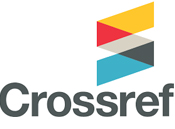Students’ Mathematical Problem-Solving Ability Reviewed from the Self-Confidence of Junior High School Students
Abstract
This study aims to describe the problem-solving abilities of students reviewed from their self-confidence. This method of this study is a qualitative descriptive research method. This study was conducted at Junior High School in Kampar. The subjects of this study were students of seventh grade in the 2020/2021 academic year as many as 20 students. The data analysis was carried out in three stages: data reduction, data presentation, and concluding. The data from this study were obtained by providing 5 items of mathematical problem-solving ability, distributing a questionnaire about self-confidence using a Likert scale in the form of a checklist, and conducting interviews. The results showed that there was a relationship between students' self-confidence and mathematical problem-solving abilities. From the questionnaire score category and the results of the problem-solving ability test given, it can be seen that 25% of students who have high self-confidence have good problem-solving skills because they meet all problem-solving indicators. Sixty percent of students who have moderate self-confidence have fairly good problem-solving abilities because they only meet part of the 4 problem-solving indicators. Fifteen percent of students belonging to the low category of self-confidence have problem-solving skills that are not good enough. The findings of this study can motivate teachers to raise students' self-confidence because students who have good self-confidence have good problem-solving abilities as well. The study's findings suggest that teachers should use methods and techniques to boost students' self-confidence in mathematics learning.
References
Kemendikbud, Kurikulum SMP. Jakarta: Kemendikbud, 2014.
Soedjadi, “Pembelajaran Matematika Berjiwa RME,” in Seminar Nasional tentang Pendidikan Matematika Realistik USD Yogyakarta, 2001.
U. Sumarmo, “Berpikir Dan Disposisi Matematika Serta Pembelajarannya,” Bandung, 2014.
National Council of Teachers of Mathematics, “Principles and Standards for School Mathematics,” 2000. [Online]. Available: https://www.nctm.org/Standards-and-Positions/Principles-and-Standards/. [Accessed: 03-Mar-2021].
R. Derniati, Y. Roza, and Maimunah, “Analisis kemampuan Pemecahan masalah matematis siswa MTsN 3 Kuantan Singingi,” Eksakta J. Penelit. dan Pembelajaran MIPA, vol. 5, no. 1, pp. 1–12, 2020.
H. Hendriana and U. Sumarmo, Penilaian Pembelajaran Matematika. Bandung: PT Refika Aditama, 2017.
L. R. Ramadhana, K. Karim, and R. Amalia, “Pengaruh Model Double Loop Problem Solving (DLPS) Terhadap Kemampuan Pemecahan Masalah Matematis Siswa SMP,” EDU-MAT J. Pendidik. Mat., vol. 6, no. 2, pp. 210–217, 2018.
E. D. Adifta, M. Maimunah, and Y. Roza, “Analisis Kemampuan Pemecahan Masalah Siswa Madrasah Tsanawiyah Kelas VII pada Materi Himpunan,” J. Kependidikan J. Has. Penelit. dan Kaji. Kepustakaan di Bid. Pendidikan, Pengajaran dan Pembelajaran, vol. 6, no. 2, pp. 340–348, 2020.
N. Nadhifa, M. Maimunah, and Y. Roza, “Analisis Kemampuan Pemecahan Masalah Siswa pada Materi Bangun Ruang Sisi Datar,” Numer. J. Mat. dan Pendidik. Mat., vol. 3, no. 1, pp. 63–76, 2019.
F. Maisyaroh Agsya, M. Maimunah, and Y. Roza, “Analisis Kemampuan Pemecahan Masalah Ditinjau dari Motivasi Belajar Siswa MTs,” Symmetry Pas. J. Res. Math. Learn. Educ., vol. 4, no. 2, pp. 31–44, 2019.
W. Rigusti and H. Pujiastuti, “ANALISIS KEMAMPUAN PEMECAHAN MASALAH DITINJAU DARI MOTIVASI BELAJAR MATEMATIKA SISWA,” Prima J. Pendidik. Mat., vol. 4, no. 1, pp. 1–10, 2020.
N. Y. Dewi, Supriyo, and S. Saraswati, “Upaya Meningkatkan Kepercayaan Diri melalui Layanan Bimbingan Kelompok pada Siswa Kelas X1,” Indones. J. Guid. Couns. Theory Appl., vol. 1, no. 2, pp. 13–17, 2012.
I. Trisnawati, W. Pratiwi, P. Nurfauziah, and R. Maya, “Analisis Kemampuan Berpikir Kreatif Matematis Siswa SMA Kelas XI Pada Materi Trigonometri Ditinjau dari Self Confidence,” JPMI (Jurnal Pembelajaran Mat. Inov., vol. 1, no. 3, pp. 383–394, 2018.
M. N. Ghufron and R. Risnawati, Teori-Teori Psikologi. Yogyakarta: Ar-Ruzz Media, 2012.
Syaipul Amri, “Pengaruh kepercayaan diri (Self Confidence),” J. Pendidik. Mat. Raflesia, vol. 3, no. 2, pp. 156–168, 2018.
A. Islami and N. Rusliah, “Pengaruh Self Confidence Terhadap Pemahaman Konsep Matematis Siswa Sekolah Menengah Pertama,” Pros. Semin. Nas. Integr. Mat. dan Nilai Islam., vol. 3, no. 1, pp. 187–193, 2020.
I. N. Noviyana, N. R. Dewi, and Rochmad, “Analisis Kemampuan Komunikasi Matematis Ditinjau dari Self-Confidence,” Prism. Pros. Semin. Nas. Mat. 2, vol. 6, no. 2, pp. 704–709, 2019.
R. C. Hastari, “Analisis Kesulitan Penyelesaian Soal Matematika Ditinjau Dari Kecerdasan Emosional Mahasiswa Di Kabupaten Tulungagung,” JNPM (Jurnal Nas. Pendidik. Mat., vol. 2, no. 2, pp. 180–196, 2018.
Sugiyono, Metode Penelitian Pendidikan (Pendekatan Kuantitatif, Kualitatif, dan R&D). Bandung: Alfabeta, 2012.
R. Nurpalah and N. N. Setyawidianingsih, “Analisis Kemampuan Berpikir Kritis Matematis dan Kepercayaan Diri Siswa MTs di Kabupaten Bandung Barat,” J. Educ., vol. 1, no. 2, pp. 353–364, 2014.
A. Sudijono, Pengantar Evaluasi Pendidikan. Jakarta: Raja Grafindo Persada, 2016.
R. Hartono, Analisis Item Instrumen. Pekanbaru: Zanafa, 2010.
Riduwan, Belajar Mudah Penelitian Untuk Guru-Karyawan dan Peneliti Pemula. Bandung: Alfabeta, 2015.
Hartono, Statistik untuk Penelitian. Yogyakarta: Pustaka Pelajar, 2010.
B. A. Siregar, Maimunah, and Y. Roza, “Analisis Kemampuan Pemahaman Konsep Matematias Ditinjau dari Self Confidence Siswa MTs Pekanbaru,” J. Pendidik. Mat. APOTEMA, vol. 6, no. 1, pp. 27–33, 2020.
Copyright (c) 2021 Journal of Research on Mathematics Instruction (JRMI)

This work is licensed under a Creative Commons Attribution-NonCommercial-ShareAlike 4.0 International License.






